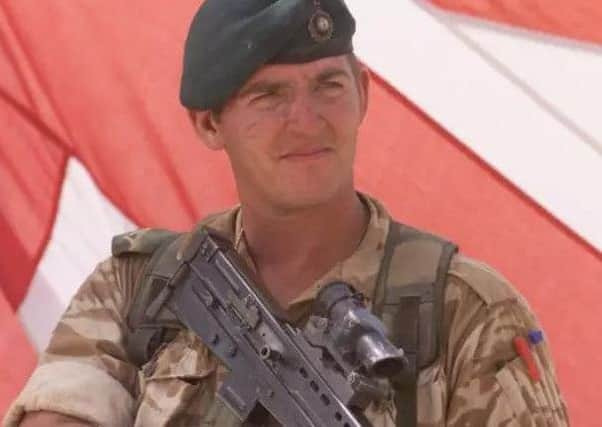Andrew Vine: Bravery of Sgt Alexander Blackman failed by a craven military establishment


He is Sergeant Alexander Blackman, of the Royal Marines, jailed for life in 2013 after being convicted of murdering a Taliban insurgent two years before during some of the most vicious fighting seen in Afghanistan.
Last week, his murder conviction was quashed by five Appeal Court judges who cut his sentence to seven years for manslaughter, on the grounds that he was suffering from a combat stress disorder.
Advertisement
Hide AdAdvertisement
Hide AdHaving spent almost half that sentence in jail already, Sgt Blackman’s release is imminent.
But life for him and his wife, Claire, will never be the same again. His military career is over, and he is a convicted killer. He is only 42. How he will earn a living in the years ahead is uncertain.
Worse, he and his wife may need police protection because the security services have warned that he is a target for Islamist extremists intent on murder.
And all because, in the heat of battle against a merciless foe, he made the split-second judgment to kill a wounded terrorist to ensure he could no longer present a threat.
Advertisement
Hide AdAdvertisement
Hide AdThe case of Sgt Blackman is a stain upon this country’s military establishment, not least because its failures of command left him fighting insurgents with only a half-strength unit in an area described by soldiers as “the most dangerous square mile on Earth”.
This was a man of such calibre, that being childless himself, he took on additional patrol duties to spare the men under his command who were fathers, so increasing their chances of coming out alive and returning to their children. Such bravery, such selflessness, deserved to have been rewarded with decorations for valour. But no, instead, Sgt Blackman was hung out to dry by senior officers who should have understood what he faced.
He should never have been put before a court martial for what happened, let alone convicted and imprisoned whilst his wife fought for a new hearing.
Natural justice, and a realistic appreciation of what life was like for the soldiers fighting in a God-forsaken hellhole like Afghanistan demanded that what happened on the battlefield should have been left there.
Advertisement
Hide AdAdvertisement
Hide AdWho cares what was done to some crazed lunatic who, up until the moment he was shot and wounded, was doing his utmost to kill British soldiers?
Were the consequences for Sgt Blackman not so calamitous, it would be laughably absurd that the military establishment appeared to be more concerned about a Taliban terrorist than one of their own men.
The suspicion has to be that at least some of those responsible for the court martial process that sent Sgt Blackman to prison had never faced any danger greater than suffering a paper cut whilst sitting at their desks.
Those who had known battle would have viewed his actions differently, like the Falklands War veterans who gathered at the National Memorial Aboretum on Sunday to mark the 35th anniversary of the Argentine invasion of the islands.
Advertisement
Hide AdAdvertisement
Hide AdThat brutal conflict, which claimed 255 British servicemen’s lives, produced at least one documented incident that has echoes of Sgt Blackman’s case.
After the battle of Goose Green, the late ITN war correspondent, Michael Nicholson, witnessed an horrific episode.
An Argentine soldier who had been taken prisoner produced a grenade he had kept hidden, and threw it into a pile of ammunition, which exploded in a fireball that wounded many.
Nicholson wrote: “A British medical orderly pulled two out of the flames and went back for a third. But his legs had been blown off and he could not be moved. I turned away, then heard a shot. The orderly could not let him burn to death.”
Advertisement
Hide AdAdvertisement
Hide AdNicholson was careful not to reveal whether the man put out of his suffering was British or Argentine. Judged by the same standards applied to Sgt Blackman, the orderly who pulled the trigger was guilty of murder, but greater sense prevailed in military circles in 1982 than it did in 2013.
There was no court martial, simply the grim acceptance that the desperate cruelties of war produce situations so far beyond the norms of ordinary life that they cannot, and should not, have judgment passed on them later by those who were not faced by terrible decisions. Judged by the same preposterous standards that Sgt Blackman has been subject to, that was a war crime.
Sadly, Sgt Blackman will not be the last hung out to dry by craven military chiefs apparently more concerned about conforming to modern-day norms of political correctness than standing up for soldiers.
What a way to treat those who volunteer to serve their country, and confront danger with unflinching bravery. Britain is rightly proud of its servicemen and women. Some of those commanding them deserve rather less respect.